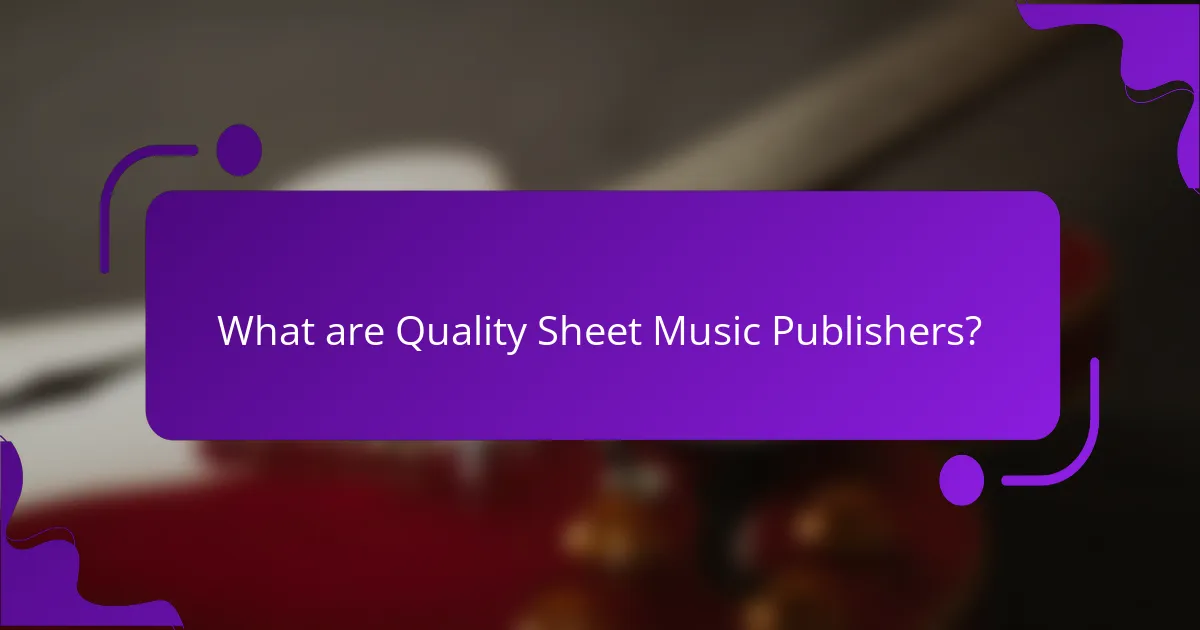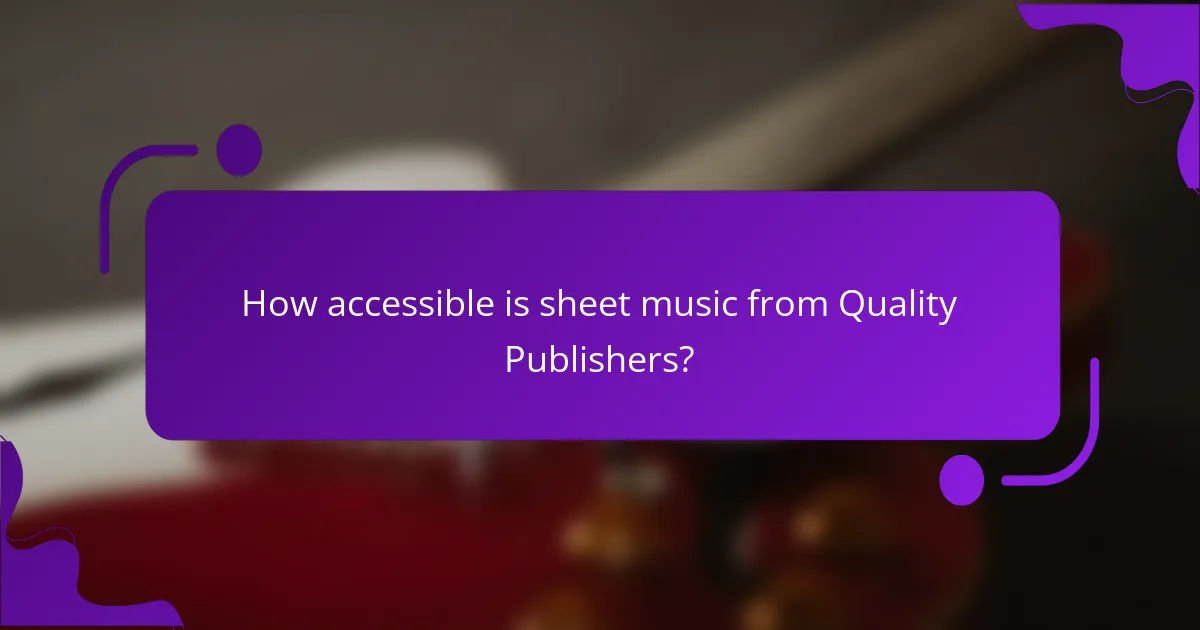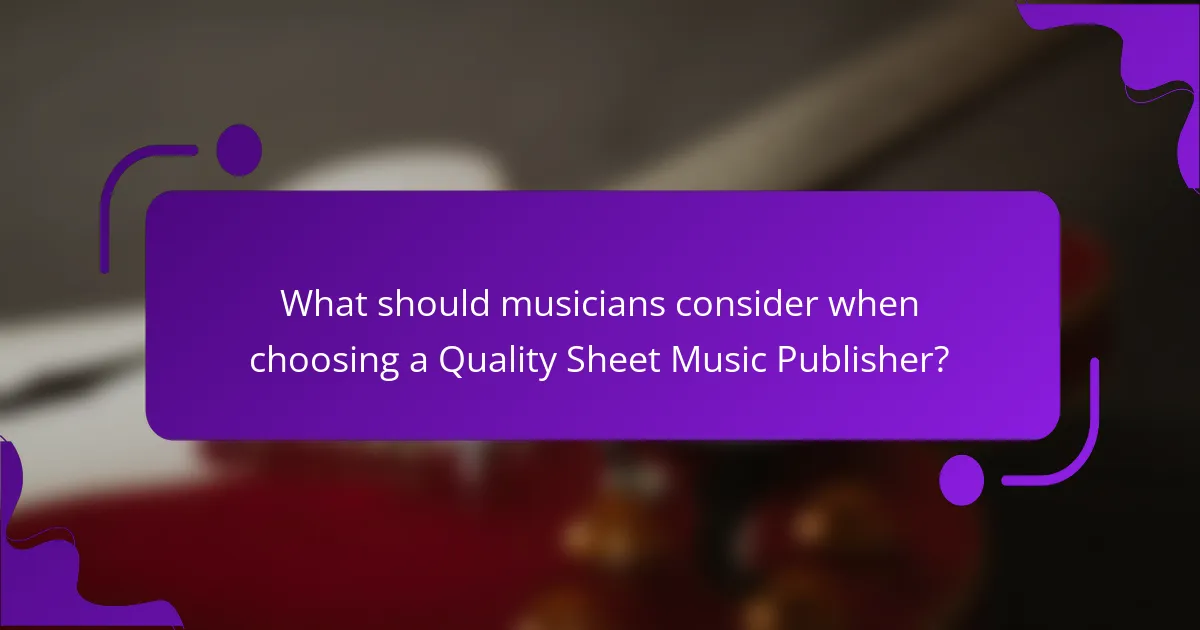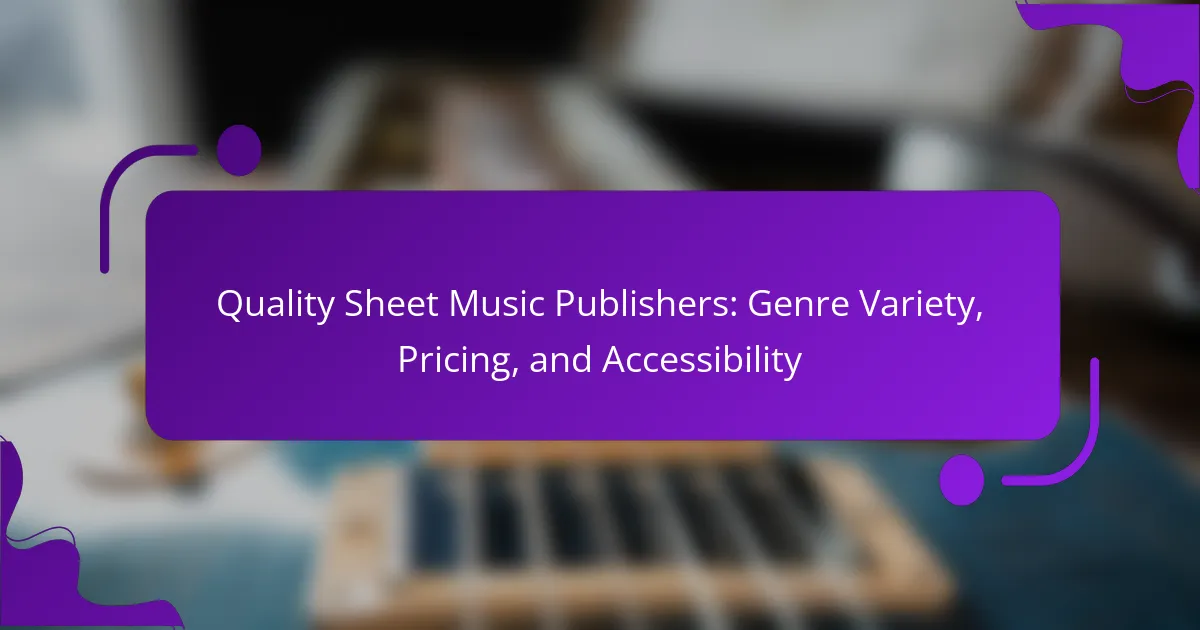Quality sheet music publishers are companies that produce and distribute high-quality musical scores, ensuring accuracy in notation and readability. This article explores the characteristics of these publishers, including their specialization in various genres, competitive pricing, and accessibility of both digital and physical formats. It highlights the importance of a publisher’s reputation, the diversity of their catalogs, and the support services they offer, such as practice tips and performance guides. By examining these factors, musicians can make informed decisions when selecting sheet music that meets their needs.

What are Quality Sheet Music Publishers?
Quality sheet music publishers are companies that produce and distribute high-quality musical scores. They ensure accuracy in notation and provide clear, readable formats. These publishers often specialize in various genres, catering to diverse musical needs. They may offer printed music, digital downloads, and licensing options. Established publishers often have a reputation for quality and reliability. Examples include Hal Leonard and Alfred Music, known for their extensive catalogs. Quality sheet music publishers also invest in editorial processes to maintain high standards. Their work supports musicians, educators, and performers in accessing quality materials.
How do Quality Sheet Music Publishers differ from others?
Quality sheet music publishers prioritize accuracy and presentation. They ensure that the music is meticulously edited and formatted. This results in a more professional product. Quality publishers often provide a wider variety of genres. They cater to diverse musical tastes and needs. Their pricing reflects the quality of their offerings, often being higher due to superior production standards. Accessibility is also a focus; they may offer digital formats for ease of use. These factors collectively set quality sheet music publishers apart from others in the industry.
What attributes define a Quality Sheet Music Publisher?
A quality sheet music publisher is defined by several key attributes. These include a diverse catalog of genres, ensuring a wide selection for various musical tastes. High-quality print and digital formats are essential for readability and usability. Competitive pricing strategies are important to make music accessible to a broader audience. Effective distribution channels enhance availability across different platforms. Strong relationships with composers and artists ensure a steady influx of new material. Additionally, excellent customer service contributes to a positive user experience. A commitment to copyright compliance protects the interests of creators and publishers alike. These attributes collectively establish a reputable and effective sheet music publisher.
Why is quality important in sheet music publishing?
Quality is important in sheet music publishing because it ensures accuracy and readability. Accurate notation prevents performance errors. High-quality printing enhances legibility for musicians. Quality materials increase the durability of sheet music. Musicians rely on precise instructions for interpretation. Poor quality can lead to miscommunication of musical intent. Research indicates that well-published music improves learning outcomes. Higher quality also reflects professionalism in the publishing industry.
What genres do Quality Sheet Music Publishers cover?
Quality Sheet Music Publishers cover a wide range of genres. These genres include classical, jazz, pop, rock, and folk music. Many publishers also provide material for educational purposes, such as choral and instrumental music. Additionally, some publishers specialize in niche genres like world music and contemporary Christian music. The diversity in genres allows musicians of all levels to find suitable sheet music for their needs. This extensive selection supports various performance settings, from solo practice to large ensembles. Quality publishers ensure that their offerings cater to different tastes and skill levels in the music community.
How does genre variety enhance the value of sheet music?
Genre variety enhances the value of sheet music by catering to diverse musical tastes and preferences. This variety allows musicians to explore different styles, from classical to jazz, broadening their repertoire. A wider selection of genres fosters creativity and innovation in performance. Additionally, it attracts a larger audience, increasing sales and accessibility. Research shows that diverse offerings can lead to higher customer satisfaction. For example, publishers that provide a range of genres often see increased engagement from musicians. This engagement ultimately boosts the overall value of the sheet music in the market.
What are the most popular genres among Quality Sheet Music Publishers?
The most popular genres among quality sheet music publishers include classical, jazz, pop, and rock. Classical music remains a staple, with publishers offering a wide range of compositions from various eras. Jazz is favored for its improvisational nature and rich history, attracting both musicians and educators. Pop music is highly sought after due to its contemporary appeal and widespread recognition. Rock music continues to be popular, appealing to a younger audience and covering a variety of sub-genres. These genres account for a significant portion of sheet music sales and reflect current musical trends and educational needs.
What pricing strategies do Quality Sheet Music Publishers use?
Quality Sheet Music Publishers typically use a combination of pricing strategies. These include tiered pricing, which offers different price points for various product levels. They also implement bundling, where multiple pieces are sold together at a discounted rate. Subscription models are another common strategy, providing access to a library of sheet music for a recurring fee.
Additionally, publishers may use promotional pricing during specific seasons or events to attract more customers. They often analyze competitor pricing to remain competitive in the market. Quality and exclusivity can also justify higher prices for premium editions. These strategies help publishers maximize revenue while catering to diverse customer needs.
How do pricing models vary among different publishers?
Pricing models among different publishers vary significantly based on several factors. Some publishers use a flat-rate pricing model, charging a single price for access to their entire catalog. Others employ a tiered pricing structure, where costs increase with the level of access or additional features. Subscription models are also common, allowing users to pay a recurring fee for ongoing access to sheet music. Additionally, some publishers may offer pay-per-piece pricing, where customers pay for each individual sheet music piece they wish to download. Factors influencing these models include the publisher’s target audience, the genre of music, and the distribution method. For example, digital publishers often have lower overhead costs, allowing for more competitive pricing. In contrast, print publishers may need to account for production and shipping costs, affecting their pricing strategies.
What factors influence the pricing of sheet music?
The pricing of sheet music is influenced by several key factors. First, the complexity of the arrangement affects the price. More intricate arrangements typically cost more due to the additional time and skill required for composition. Second, the popularity of the piece plays a significant role. Well-known songs or classical works often have higher prices due to demand. Third, the format of the sheet music matters. Digital versions are usually less expensive than printed copies. Fourth, the publisher’s reputation can influence pricing. Established publishers may charge more based on their brand value. Lastly, licensing fees for copyrighted material contribute to the overall cost. These factors collectively determine the market price of sheet music.

How accessible is sheet music from Quality Publishers?
Sheet music from Quality Publishers is highly accessible. Many publishers offer digital downloads, allowing instant access to a wide variety of titles. Physical copies are available through numerous online retailers and local music stores. Additionally, many Quality Publishers provide free samples or previews of their sheet music. This approach enhances accessibility for musicians seeking to evaluate music before purchase. Overall, the combination of digital and physical formats ensures that sheet music is readily available to a broad audience.
What formats are available for accessing sheet music?
Sheet music is available in several formats. Common formats include printed sheets, digital PDF files, and interactive apps. Printed sheets are physical copies that can be purchased at music stores. Digital PDF files allow for easy download and printing at home. Interactive apps provide features like playback and annotation. These formats cater to different preferences and needs for musicians.
How does digital access compare to print access?
Digital access provides immediate availability of sheet music, while print access requires physical copies. Digital formats allow for easy search and navigation through vast libraries. Users can access digital sheet music from multiple devices at any time. Print access, however, involves purchasing and storing physical materials. Digital access often offers lower costs due to reduced production expenses. According to a study by the International Music Publishers Association, digital sales have increased significantly, indicating a shift in consumer preference. This demonstrates the growing importance of digital access in the sheet music market.
What platforms facilitate the accessibility of sheet music?
Platforms that facilitate the accessibility of sheet music include websites and applications like MusicNotes, Sheet Music Plus, and IMSLP. MusicNotes offers a vast library of digital sheet music for various instruments and genres. Sheet Music Plus provides both physical and digital sheet music, catering to diverse musical tastes. IMSLP, the International Music Score Library Project, offers free access to public domain sheet music. Other notable platforms include MuseScore, which combines sheet music sharing with a community of musicians, and Scribd, which allows users to access a range of sheet music among other documents. These platforms enhance accessibility by providing options for instant downloads and physical purchases.
What are the benefits of purchasing from Quality Sheet Music Publishers?
Purchasing from Quality Sheet Music Publishers ensures access to high-quality, accurately notated music. This accuracy enhances performance and learning for musicians. Quality publishers often provide a wide range of genres, catering to diverse musical tastes. Their catalogs typically include both popular and classical pieces, which broadens options for musicians.
Additionally, these publishers often offer competitive pricing, making quality music more accessible. Many quality publishers provide digital formats, allowing for immediate access and convenience. This accessibility supports musicians in finding the right material quickly. Overall, purchasing from these publishers guarantees both quality and variety, essential for effective musical practice.
How does quality impact the performance of musicians?
Quality directly impacts the performance of musicians by influencing their ability to interpret and execute music accurately. High-quality sheet music provides clear notation, proper formatting, and accurate transcriptions. This clarity allows musicians to focus on their performance rather than struggling with errors or ambiguities in the music. Research indicates that musicians using high-quality materials are more likely to achieve higher performance standards. For example, a study published in the Journal of Music Education found that students using well-edited scores demonstrated improved sight-reading skills. Thus, quality in sheet music is essential for enhancing musicians’ overall performance capabilities.
What value-added services do Quality Sheet Music Publishers offer?
Quality Sheet Music Publishers offer services such as custom arrangements, digital distribution, and educational resources. Custom arrangements allow musicians to tailor music to specific needs. Digital distribution ensures easy access to a wide range of sheet music. Educational resources include tutorials and practice guides for various instruments. These services enhance the overall user experience for musicians. Statistics show that publishers providing educational materials see increased customer engagement. Additionally, many publishers offer subscription services for ongoing access to new music. This model supports both casual and professional musicians in their pursuits.

What should musicians consider when choosing a Quality Sheet Music Publisher?
Musicians should consider the publisher’s reputation and track record. A quality sheet music publisher has a history of producing accurate and well-arranged scores. They should also evaluate the variety of genres offered. A diverse catalog allows musicians to explore different styles and repertoire. Pricing is another critical factor. Competitive pricing ensures affordability for musicians at all levels. Accessibility of the music is essential as well. Publishers should provide easy access to both physical and digital formats. Finally, examine the support services offered. Quality publishers often provide additional resources like practice tips or performance guides.
How can musicians assess the quality of a publisher?
Musicians can assess the quality of a publisher by examining several key factors. First, they should evaluate the publisher’s catalog. A diverse range of genres indicates a commitment to variety. Next, musicians should consider the quality of the sheet music. High-quality print and accurate notation are essential for performance. Additionally, musicians can research the publisher’s reputation. Reviews and testimonials from other artists provide insight into reliability. Pricing structures should also be analyzed. Competitive pricing without sacrificing quality is a positive indicator. Finally, accessibility is important. Publishers offering digital formats and easy ordering processes enhance convenience. These factors collectively help musicians determine the quality of a publisher.
What criteria should be used to evaluate sheet music quality?
The criteria to evaluate sheet music quality include accuracy, clarity, and layout. Accuracy refers to the correct representation of notes and rhythms. Clarity involves the readability of the notation and markings. A well-organized layout enhances the performance experience. Additional factors include the quality of paper and print. High-quality materials contribute to durability and ease of use. Consistency in formatting is also important across the entire piece. These criteria ensure that musicians can perform effectively and with confidence.
Why is it important to read reviews and testimonials?
Reading reviews and testimonials is crucial for informed decision-making. They provide insights into the experiences of other customers. This information can help gauge the quality of sheet music publishers. Reviews often highlight specific attributes such as genre variety and pricing. Testimonials can reveal how accessible the publishers are for different skill levels. Studies indicate that 84% of people trust online reviews as much as personal recommendations. This trust can significantly influence purchasing decisions. Consequently, reading reviews and testimonials helps ensure satisfaction with the chosen publisher.
What tips can help musicians find the best sheet music deals?
Musicians can find the best sheet music deals by comparing prices across multiple online retailers. Websites like MusicNotes, Sheet Music Plus, and Hal Leonard often have sales or discounts. Signing up for newsletters from these sites can provide exclusive offers. Additionally, exploring digital sheet music options can be more cost-effective than printed versions. Utilizing social media groups focused on music can also reveal shared deals among musicians. Checking for bundle deals or purchasing multiple pieces at once can lead to savings. Finally, visiting local music stores may uncover clearance items or special promotions not available online.
How can musicians stay informed about promotions and discounts?
Musicians can stay informed about promotions and discounts by subscribing to newsletters from sheet music publishers. Many publishers offer exclusive deals to their email subscribers. Additionally, following publishers on social media platforms can provide real-time updates on sales and promotions. Joining online music communities and forums often leads to shared information about discounts. Websites that aggregate sheet music sales may also alert musicians to current promotions. Checking publisher websites regularly can reveal time-sensitive offers. These methods ensure musicians are aware of the best deals available.
What resources are available for comparing publishers?
Resources for comparing publishers include publisher comparison websites, industry reviews, and user ratings. Websites like MusicNotes and Sheet Music Plus offer user-generated ratings and reviews. These platforms allow users to evaluate publishers based on pricing and genre variety. Industry reviews from music education journals provide insights into publisher quality. Additionally, social media groups and forums can be valuable for firsthand experiences. These resources help musicians make informed choices when selecting sheet music publishers.
Quality sheet music publishers are companies dedicated to producing and distributing high-quality musical scores, ensuring accuracy and readability across various genres. This article explores the defining attributes of these publishers, including their commitment to quality, diverse catalog offerings, and effective pricing strategies. It also examines the accessibility of sheet music through various formats and platforms, highlighting the benefits of purchasing from reputable publishers. Additionally, the article provides insights into how musicians can evaluate publishers and find the best deals, emphasizing the importance of quality in enhancing musical performance.
